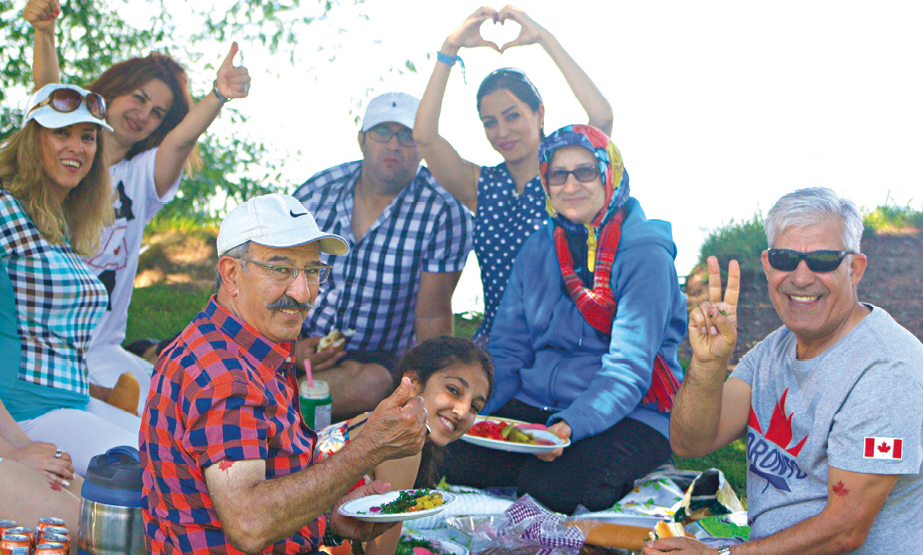Thoughts on how welcoming we are, and of whom
BY COLIN BREZICKI Special to the VOICE
Fourteen months away from a Federal election and we’re already told immigration is the burning issue.
I find that kind of sad.
With all the challenges we face—climate change, crime, economic instability—we lock horns over who gets to live here.
Our political leaders will play to the righteous and the reprehensible, depending on which side you’re on. And it’s heating up.
Recently Mr. Trudeau accused a woman activist at a corn roast of being racist for opposing Ottawa’s policy on “irregular asylum seekers.”
I wasn’t aware Ottawa even had a policy to oppose, but maybe I’m out of the loop. Anyway, racist accusations get tossed around a lot these days—either because it’s on the increase, or the term spreads itself more thinly now—but maybe Mr. Trudeau had reason this time. It appears the woman belonged to at least one organization that doesn’t like immigrants.
A day or so later the Prime Minister went further, and informed the nation that merely welcoming new arrivals isn’t enough, that as Canadians, “We need to talk about love and acceptance.”
I’m sure it wasn’t his intention, but I was reminded of Christ when he (Jesus, not Justin) told his followers to love their neighbour as themselves.
Who is my neighbour, asked one man. A good question, to which the good Lord supplied a very good answer in his parable of the good Samaritan. A man en route to Jericho is seriously mugged and left for dead at the roadside. A couple of passers-by take no notice, but a third stops to help the wretched man out.
Go and do likewise, said Jesus.
He didn’t add qualifiers or exceptions. Nothing about first questioning the mugged traveler to see if his belief system was acceptable.
Same with Justin. Unconditional. We must, going forward, love and accept everyone, whatever race, creed, and values they embrace. You just do it.
Or at the very least, say you do.
 Ticking a box is easy enough, but when it comes to putting it into practice I think a special kind of person is needed.
Ticking a box is easy enough, but when it comes to putting it into practice I think a special kind of person is needed.
A saint.
No doubt Mr. Trudeau reckons that loving and accepting everyone is a good place to start. We can go from there, maybe.
Except this is there. There’s nowhere left to get to. Never mind a starting point, we’re already at the finish line and how easy was that?
But what if, on my list of people to love, I come across a xenophobe, like the woman at the corn roast, or a misogynist, homophobe, anti-Semite, or Islamophobe? What if my list includes a supporter of cap and trade, and the Kinder-Morgan pipeline?
What if he or she is pro-life, not pro-choice, or disapproves of Wynn’s sex-ed curriculum in our primary schools, and insists on voting for Not My Party?
The trouble with loving everyone is that when you scratch the surface no one is all that lovable any more.
Edmund Burke, a reasonable man, did not buy into the top-down approach to love and acceptance. He found it unrealistic, not to say disingenuous. His own take on human nature was that all but the supremely virtuous tend to connect with people who share their “resemblances, conformities and sympathies.”
That was his starting point, and from there he encouraged us to enlarge our compass through education, empathy and actually meeting people who are not us.
Burke believed that most people, being merely mortal, find it impossible to be loyal to universal declarations or international pieties, though these things are easy enough to declare.
Burke actually believed such loyalties can lead to a zealous righteousness and even fanaticism.
But we all know that fanaticism is the exclusive domain of the politically right and never the politically left, so here I must part ways with Edmund Burke.
Neither a saint nor a zealot myself, I prefer the company of ordinary people.
I encountered some on Canada Day last year. Oddly enough, at the roadside, like in the parable.
My mother and I were enjoying a picnic at a secluded spot on the Niagara River. We were quietly celebrating Canada’s 150th anniversary, when two minivans pulled in behind us. Ten people emerged from the vehicles, loaded with blankets and picnic hampers, and approached us. I could see my mother wasn’t happy at the invasion, and I sympathized—there were suddenly a lot of people around.
Before they spread out their blankets one of their party came up, and smiling, said, “Do you mind if we share your picnic place? We can go somewhere else if you’d like.”
We had no claim to the spot, so it wasn’t our place to deny them. And they weren’t really asking our permission. They were being polite, and considerate, and civil.
I responded, “Of course. There’s lots of room. Come and join us.”
They thanked us, spread their blankets and opened up their hampers. Eventually, the man reached over to hand me a loaded paper plate and two plastic cups.
“Iranian food, I hope you like it.”
I accepted his offering and thanked him. I enjoy Middle Eastern food, though I found the yoghurt soda an acquired taste. They got on with their picnic, and we continued to exchange small talk through the afternoon.
In the end I asked if I could take a photo. We were having such a good time I wanted a memento. They mugged for the camera and shouted, “Happy Canada Day” as I took the picture.
I can’t say I loved these friendly people, because I didn’t know them, nor did they know me. We didn’t share views on politics, or religion, sex education, gay marriage, abortion or immigration. It could have led to disagreement and spoiled the day. One of us might have packed up and left in a huff. Instead, respectful of the other’s differences, we simply shared a picnic spot and each other’s company.
“Diversity Is Strength,” is now a slogan that appears at the bottom of the screen on CFL broadcasts, and it always makes me think of Orwell—but it wasn’t what I felt that day. I know it’s what I’m supposed to believe but somehow it rings hollow. I subscribe to Unity is Strength.
And I prefer to think of our nation as a mosaic, a composite picture made up of many disparate pieces. Where a jigsaw of interlocking parts would adhere by itself, the diverse pieces in a mosaic can’t adhere without a bonding agent. An adhesive.
For me that bond is tolerance, not love. A respect for differences that define diversity.
We do not all believe in the same things, or think in the same way, and imagining we do is not in my skill set.
I don’t believe for example, on religious or any other grounds, that abortion is wrong, or that women are subordinate and should dress accordingly, or that handguns should be legal, or that everyone must subscribe to this nebulous, amorphous thing we call “Canadian values.”
But many of our citizens believe differently. Some subscribe to values that entitle them to choose who their children can marry, or what medical treatment they may receive, or whether their partners can go out to work. There’s nothing illegal here—it’s not like Holocaust denial, or hate speech, or sexual harassment—and while I don’t share these values myself, I respect another’s prerogative to have them.
I fully understand that my attempt at tolerance is a far cry from the universal love recommended by my betters, and I hope they can find it in themselves to suffer my shortcomings.
Meantime, I’ll never forget who my neighbours are. I found them at the roadside, not beaten or robbed, thank God, only asking if they could share our patch of ground. ◆



